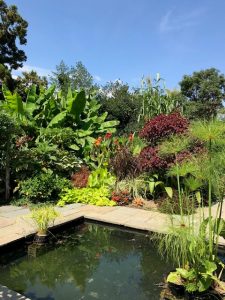In a recent visit to the Teaching Gardens at Farmingdale State University, the Master Gardeners toured the beautiful gardens, learning first hand how changing climate conditions can affect how we garden. Plants and tropicals once only hardy to southern environments are now flourishing here on Long Island, and if conditions are right, certain varieties may be able to successfully overwinter in the garden.
As gardeners continually adapt to changing weather patterns, they understand how these changes may impact our precious landscape and natural resources. Here are some simple steps the home gardener can take, as described by Professor David Wolfe from the Department of Horticulture at Cornell University, to adapt to these changing climate conditions:
- Vary your plant selection and try new varieties that may be better suited to your changing climate. Select drought and heat tolerant plants that are resistant to diseases and insect pests.
- Consider shifting planting times: try planting cool-season crops earlier, to be harvested before the season heats up.
- Look for new weeds, pests and diseases that come as a result of a warmer climate.
- Be prepared to deal with both rainy and drought conditions: add organic matter to your soil. This will improve drainage in wet areas and retain water in drought-prone areas.
Wolfe also suggests various ways to reduce our carbon footprint, by strategically using fertilizers, storing carbon in soil, planting trees, and reducing fossil fuel use, and reducing, reusing and recycling disposable products.
You can learn more about Gardening in a Changing Climate at Wolfe’s page at http://blogs.cornell.edu/hort/2011/04/04/wolfe-gardeners-part-of-climate-change-solution/ and enroll in a new, free online course starting on September 11th, “Climate Change Science, Communication and Action,” offered by Cornell University Civic Ecology.
Climate Change Science, Communication and Action is an online course designed for Extension Educators, Master Gardener Volunteers, state and local government, land trusts and other non-profits, and others interested in an introduction to climate change science and how to communicate effectively about this important topic. Participants will make new connections and share resources as part of an online network of Cornell University professionals, students, volunteers, and others interested in Climate Change Science.
On a local level, CCE Suffolk Community Horticulture has formed a local group of course participants, who will use what they learn from this course and apply it to our educational outreach and community needs. The course dates are September 11-October 1, 2017, and you can find the registration link below. Once registered, please contact dalesecooke@cornell.edu to be added to the Suffolk CCE Community Action group on Facebook, and to be informed of local meetings where we will meet as a group in Suffolk County.
Links:
Department of Horticulture: http://blogs.cornell.edu/hort/2011/04/04/wolfe-gardeners-part-of-climate-change-solution/
Interactive USDA Plant Hardiness Zone Map, where you can find your zone by ZIP code: http://planthardiness.ars.usda.gov/PHZMWeb/InteractiveMap.aspx
Submitted by Donna Alese Cooke, Community Horticulture Specialist, Cornell Cooperative Extension of Suffolk


It brings a man and woman closer to nature. Nature in its full glory is revealed in a garden. It leads man from joy to joy. It is a very tasteful hobby. Gardening has always been a loving preoccupation for man or woman. It inspires taste, purity and refinement.